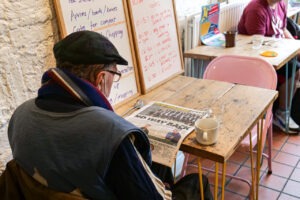In this new Just FACT blog series ‘Food Justice – reshaping the narrative around food insecurity ‘ – Hussina Raja, Just FACT Mobiliser speaks with people working in cafes across Walthamstow, Hackney and Tower Hamlets to learn more about the food scene and hospitality sector as well as finding out how accessible these spaces are to the local community.
Hussina Raja speaks with Holly and Vaish about the day-to-day running and model behind the Gleaners Community Café Cooperative.
The Gleaners is a pay-what-you-feel community café based in the Hornbeam Centre in Walthamstow. They are a small, non-hierarchical and independent workers’ cooperative run by an amazing group of volunteers, coordinators and co-op members. They use surplus produce to create tasty plant-based meals for the local community.
Can you tell me a bit more about The Gleaners café?
The Gleaners café exists in the Hornbeam centre, a space with an existing socially engaged ethos which emerged in the 80s with an environmental and sustainability focus. The Gleaners started in the pandemic, recognising and responding to the wellbeing and isolation needs of the community in Walthamstow.
”Our vision is to build an inclusive, mixed community eating space which is socially, economically, and ecologically sustainable. We work to play a small part towards building a healthy, sustainable food system in which people and the planet are respected from seed to plate, and communities have more power over the food available to them.”
How did it all start?
We wouldn’t exist if it wasn’t for the Hornbeam Centre and our volunteers. During Covid-19, we provided hot meals and grocery bags to local residents. There were three people – Alex, David and Vinette, who were the original co-op members running the place. They opened just as the pandemic hit and found themselves in a position to be able to respond to the needs of the local community.
In January 2022 the café space was opened, and we were employed. With a bit of an injection of funding from the Hornbeam Centre, we bought some produce and got started. We use surplus produce to reduce environmental impact, stop food waste and get it to the right place: on people’s plates. Where we don’t use surplus food, we use produce from Organiclea that is returned from the markets, as well as sourcing locally for herbs and bits.
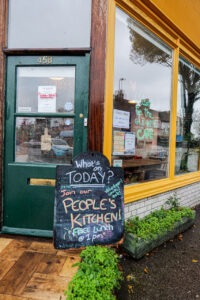
How is it structured?
The Gleaners café operates with the support of volunteers, coordinators and co-op members. Coordinators like Jess are in a paid role as a café manager. Jeff and Karel are volunteers who assist in lots of ways including with food prep and the day-to-day running of the café. The co-op members deal with the admin, management, funding and decision-making side of things, as well as being made up of people who love to cook and have free reign in the kitchen (lending itself to their delicious and tasty menu!). We combine the co-op structure with cooking. We started as volunteers, went on to be coordinators and then applied to be co-op members. The café pays staff London-living-wage which isn’t so common in the hospitality sector. Everyone works part-time between 2 and 3 days so it’s important to pay people fairly for their time when they’re living in an expensive city.
How does the pay-what-you-feel model work?
The pay-what-you-feel model is a set of shapes; a star, triangle, square and circle – you choose how much you pay based on your individual circumstances. It’s part of The Gleaners café identity and a model we’ve been experimenting with. We ask for a minimum, but no one gets turned away and everybody is our clientele. Everything was priced between £2-£10 but we just shifted the model a bit because we realised we couldn’t sustain ourselves financially and are now navigating the path of funding applications. It’s still affordable prices with a daily soup dish on the menu that’s pay-what-you-feel, while other meals are between £5-£10. We also have a pay-it forward-button where people who can afford to, buy a ‘pay it forward’ button for £5 and anyone who can’t afford a meal can take a button and pay for it. We meet with the team regularly to talk about their feelings and experiences of the model and have tweaked things so as not to always rely on funding.
We’re conscious of not being a posh café or part of the gentrification in the area while acknowledging that these cafés do exist. We’re thinking about how we can connect to people who can’t afford paying £5 on a visit to a café or don’t see themselves buying a machine coffee. It’s cool to be able to provide our service to people who don’t normally go to cafés. I don’t think I’ve seen the range we do in any other cafés or restaurants at the affordable prices we offer.
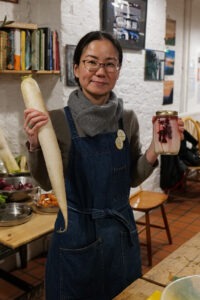
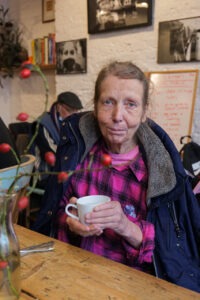
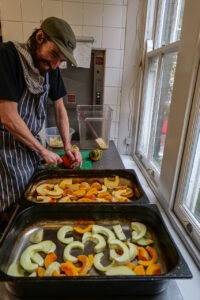
What other activities and events is the café involved in?
We cater for lots of local events in Walthamstow, like Migrant Action and the Food Partnership Network meetings. We haven’t had to advertise that much, it’s all word of mouth and people that we know. The food speaks for itself. We operate on a solidarity over charity ethos, with a sliding scale for catering.
We work with a street in Walthamstow who are very organised, the residents all know each other, and there’s a group of artists who do stuff for the street. At first they would buy our leftovers as their Friday treat, but now we cook for them. It’s a nice arrangement. It works because we have one person from the street who does the leg work to keep it organised. We send a message on a WhatsApp group sharing what we have, and they tell us what they want. It’s all about supply and demand, a service, we need the money, and they get a nice affordable meal for £5. It’s a lot of hard work but it’s worth it because we are connected to the community. We also run a supper club for a grieving group who love the space.
The hybrid of café and pop-up kitchen structure really works. We use the kitchen three days a week (Thurs-Sat) and the remaining days are open to other people and organisations to use. There are fermentation workshops, repair workshops, food distribution, the People’s kitchen, wellbeing sessions, poetry nights on offer, as well as the space being available for hire on Sundays.
We started the Leftovers Club for a local group of people who are referred to us, so we’re shut temporarily on Thursdays to the public until the 27th of July 2023. We’re stepping up our community role and remembering we’re a community organisation. It’s important to make direct contact with people in the borough who wouldn’t normally come to the café and are struggling. We’re using funding to help people learn to cook and to share our skills. It’s aligned with the ethos of the Hornbeam Centre to encourage community-led action and setting initiatives that lead to environmental and social change.

Where do you see yourselves in the future?
Ideally, we’d like to have a bigger space. The dream would be for a kitchen garden space where you can pick your own food. We’d love to open the café a few more days in the week and do a community evening slot again with events and projects, and to cook more for the borough outside of this space. We want to grow our co-op and have a steady group of coordinators.
We try to be present in what we’re doing on the day and responding to what is happening. No matter what hits us we’re very flexible and we adapt and use our skills. We’re lucky to have a lovely network of volunteers and people with lots of skills that we can call upon. We’re part of lots of WhatsApp groups where we can make offers to and cater for people in the local area, and we have a large following on Instagram.
After my conversation with Holly and Vaish, I had the pleasure of trying one of The Gleaners tasty pay-what-you-feel lunches. It was a large and healthy portion of food for the £7 I opted to pay. The added benefit was sharing a space with a diverse group of people that reflects the changing face of Walthamstow. I sat listening to conversations being had between older residents over cups of tea, as well as observing some of the young locals passing through the café for a quick coffee or lunch. The space feels very open and accessible to everyone, something that cafés across London can learn from, especially those in areas undergoing mass regeneration. The Gleaners community café knows what it wants to be and illustrates this through its open collective approach to being transparent about their finances with its contributors. It’s rare to find a café that provides affordable food and options for everyone in an expensive and ever-changing city like London.
Do check out their daily-changing menu and enjoy a bite to eat with the local community.
If you have some spare time, the café is always on the lookout for volunteers.
To find out more about the inspiring work The Gleaners café do, visit www.hornbeam.org.uk/gleaners-cafe.
Opening Hours
- Thursday: Leftovers Club workshop – 11am-2pm – not open to the public from 20th April – 27th July
- Friday: 11am – 3pm
- Saturday: 11am – 3pm
- Lunch (Brunch on Saturdays) served from 12pm – 2:45pm
Contact

Hussina Raja, Just FACT Mobiliser
Hussina is a multidisciplinary artist with a background in social justice. She is passionate about working with local community groups and young people. She especially enjoys bringing people together over food.
As part of her work on the Just FACT programme, Hussina is interested in exploring the role of cafe business models, their social responsibility and their existence as spaces for socialising and gathering, particularly in areas undergoing mass regeneration. How accessible food is in spaces of hospitality, especially for the local community, old residents and new arrivals, is a pertinent issue she wants to understand from the perspective of both the cafe and the consumer.

